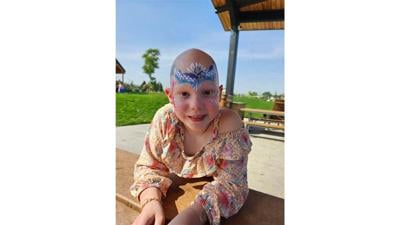(BPT) - When Keira was diagnosed with alopecia areata at just 2 years old, her mother Leslie felt lost and unsure where to turn for support. "It was so isolating and lonely," said Leslie. "I felt desperate for information and a community."
As her daughter began attending school, the diagnosis affected Keira's daily life in heartbreaking ways. One day, Keira told her mom, "Being the only bald kid at school is really hard." This made Leslie more determined than ever to connect with other families who had children with alopecia.
Leslie's search for community began with the , which connects people living with alopecia areata, their families, caregivers and medical and scientific professionals. NAAF fosters community that drives research and treatment development, raises awareness to reduce stigma and provides support to improve lives.
Finding this community helped Leslie and Keira feel seen and connected. Leslie signed up for NAAF's "You Are Not Alone" webinars and found a wealth of resources that helped ease their journey — including tools to help her approach Keira's teacher, which encouraged the family to be open with the school community about her condition.
When Leslie learned about in 2022, she created a "Walk Where You Are Team" in Minneapolis, inviting everyone who supported Keira to participate. The following year, Leslie upped her efforts with an official volunteer-led walk site inviting anyone in the Twin Cities to join.
"One of the most meaningful moments was when a man who lived with alopecia areata for over 50 years told me how healing it was to be there," Leslie recalled. "I never imagined that by trying to build a community to support my daughter, I could help others, too."
It's not just hair
, in which the body's immune system mistakes healthy tissues as dangerous and begins attacking them. "Alopecia" means bald and "areata" means patchy. The disease causes hair loss on the scalp, face and sometimes other body areas, like under the arms or on the legs. People with alopecia areata most often lose hair in circular, coin-sized patches on the scalp, but in more severe cases they may lose all their hair.
Hair loss often first appears during childhood, but how and when is different for everyone.
The chronic and unpredictable nature of alopecia areata can cause profound psychological impact, including loss of self-identity, depression, withdrawal and even suicidal ideation. Although it is frequently dismissed as a cosmetic condition, alopecia areata can be a deeply traumatic experience, resulting in emotional and economic pain and social isolation.
About worldwide and nearly will experience alopecia areata at some point in their lifetime. People of all ages, genders and racial and ethnic groups are affected by alopecia areata. New FDA-approved treatments driven by NAAF and the alopecia areata community allow some people living with severe alopecia areata to safely and effectively regrow their hair, but more research is needed, and there are many potential new treatments in the drug development pipeline.
How you can make a difference
Through the Presented by Pfizer, anyone anywhere can have a direct impact on alopecia areata treatment development, as well as helping to fund services and resources for people living with alopecia areata and their families. The Walk For Alopecia is the world's largest alopecia areata awareness and fundraising campaign, acting as the finale of Alopecia Areata Awareness Month each September. The Walk brings the alopecia areata community together, empowering individuals, families and the public to advance the change they want to see by directly funding programs and research, while shining a light on a disease which often lives in the shadows.
"Participating in the Walk For Alopecia really helped us talk about alopecia to other people. I learned a lot, and it helped us feel less nervous about what Keira might experience in life," Leslie said. "Now we feel so much more connected to everyone on the alopecia journey, and we know we are not alone!"
Ready to make a difference in a fun, active and meaningful way? Register today for the Third Annual Walk For Alopecia on Saturday, Sept. 27, at over 20 nationwide locations — or if there isn't a walk near you, you can "Walk Where You Are" as an individual or team in your neighborhood to shine a bright light on alopecia areata. Visit for information and to register.
About worldwide and nearly will experience alopecia areata at some point in their lifetime. [RB1] People of all ages, genders and racial and ethnic groups are affected by alopecia areata. New FDA-approved treatments driven by NAAF and the alopecia areata community allow some people living with severe alopecia areata to safely and effectively regrow their hair, but more research is needed, and there are many potential new treatments in the drug development pipeline.
How you can make a difference
Through the Presented by Pfizer[JS2] , anyone anywhere can have a direct impact on alopecia areata treatment development, as well as helping to fund services and resources for people living with alopecia areata and their families. The Walk For Alopecia is the world's largest alopecia areata awareness and fundraising campaign, acting as the finale of Alopecia Areata Awareness Month each September. The Walk brings the alopecia areata community together, empowering individuals, families and the public to advance the change they want to see by directly funding programs and research, while shining a light on a disease which often lives in the shadows.[RB1]we need to adjust this to be consistent with what we say other places "nearly 7 million Americans are impacted" as the 700K number does not align with the 2% world pop stat--but the 7 million does.
another option would be just to remove the US stat and focus on the 2% worldwide
[JS2]@Robbie Baker Do we want to say "Presented by Pfizer" or no because that wasn't listed as a benefit this year?










